
Sustainable Futures
Scope & Guideline
Advancing sustainable solutions for a brighter tomorrow.
Introduction
Aims and Scopes
- Sustainable Development Practices:
Research focusing on innovative practices that enhance sustainability across sectors, particularly in urban planning, agriculture, and industry. - Circular Economy Initiatives:
Exploration of circular economy frameworks and their implementation in various industries, emphasizing waste reduction, resource efficiency, and sustainable product lifecycle management. - Technological Innovations for Sustainability:
Investigation of how emerging technologies, such as blockchain and AI, can facilitate sustainable practices and improve efficiency in various sectors. - Policy and Governance Frameworks:
Analysis of policy implications and governance structures needed to support sustainable development goals (SDGs) and environmental regulations. - Socioeconomic Impacts of Sustainability:
Examination of the social dimensions of sustainability, including community engagement, equity, and economic development. - Environmental Management and Conservation:
Research on environmental conservation strategies and management practices aimed at preserving ecosystems while promoting sustainable development.
Trending and Emerging
- Digital Transformation and Sustainability:
An increasing number of studies explore the intersection of digital technologies and sustainability, highlighting how data analytics and digital governance can enhance sustainable practices. - Resilience and Adaptation Strategies:
Research focusing on resilience within communities and ecosystems in the face of climate change and other disruptions is gaining prominence. - Sustainable Finance and Investment:
There is a growing emphasis on the role of finance in sustainability, particularly regarding ESG metrics and responsible investment practices. - Food Security and Sustainable Agriculture:
Emerging research themes are centered on sustainable agricultural practices and food security, particularly in light of global challenges like climate change and geopolitical conflicts. - Community Engagement and Social Innovation:
A rising focus on community-driven initiatives and social innovation as essential components of sustainable development is evident in recent publications. - Integrated Approaches to Climate Change Mitigation:
Studies that address climate change through integrated approaches, combining technology, policy, and community action, are increasingly prominent.
Declining or Waning
- Traditional Resource Management:
Research focused on conventional resource management strategies is waning as newer, more integrated approaches like circular economy gain traction. - Single-Sector Studies:
Papers concentrating solely on one sector without interdisciplinary connections are becoming less frequent, as the journal emphasizes holistic and cross-sectoral analyses. - Static Environmental Assessments:
There is a noticeable decrease in studies that employ static assessments of environmental impacts, with a shift towards dynamic and lifecycle approaches. - Basic Awareness Studies:
Research aimed at increasing basic awareness of sustainability issues is less common, as the focus shifts to actionable strategies and policy implications. - Traditional Economic Growth Models:
Studies solely based on traditional economic growth metrics without considering sustainability implications are facing a decline in favor of more integrative models.
Similar Journals

Resources Environment and Sustainability
Advancing the Future of Environmental Science and SustainabilityResources Environment and Sustainability is a premier academic journal published by ELSEVIER, dedicated to advancing knowledge in the fields of environmental science, engineering, and sustainability practices. Recognized for its rigorous peer-review and high-quality research, the journal boasts an impressive impact factor and consistently ranks in the first quartile across multiple categories, including Environmental Engineering, Environmental Science, Management, Monitoring, Policy and Law, and Pollution. With its Scopus rankings placing it among the top journals—#7 in Environmental Science and #12 in Environmental Engineering—this journal provides a vital platform for researchers, professionals, and students seeking to contribute to evolving policies, innovative management strategies, and cutting-edge environmental solutions. Hosted in the Netherlands, Resources Environment and Sustainability is committed to fostering interdisciplinary dialogue and disseminating high-impact research that addresses the pressing challenges of our times. This journal embraces open access principles, ensuring that the wealth of knowledge it publishes remains accessible to a global audience.

Challenges in Sustainability
Pioneering Research at the Intersection of Ecology and InnovationChallenges in Sustainability, published by LIBRELLO PUBLISHING HOUSE in Switzerland, is a preeminent Open Access journal dedicated to advancing knowledge in the fields of sustainability, ecology, and environmental management. With its ISSN 2297-6477, this journal has been pivotal since its inception in 2013, providing a platform for innovative research and discourse on sustainable practices and policies. The journal currently holds a Q2 ranking in notable categories such as Ecology, Geography, Planning and Development, and Nature and Landscape Conservation, reflecting its significant contribution to these critical areas. Access options are freely available to foster a wider dissemination of knowledge, engaging researchers, professionals, and students alike. As the world grapples with pressing environmental challenges, Challenges in Sustainability serves as an essential resource for those seeking to address complex sustainability issues through interdisciplinary research and informed policy advocacy.
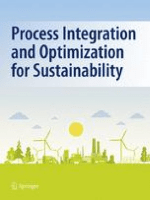
Process Integration and Optimization for Sustainability
Optimizing Pathways to Sustainability ExcellenceProcess Integration and Optimization for Sustainability is an esteemed journal, published by SPRINGERNATURE, dedicated to advancing knowledge in the realms of chemical engineering, environmental science, and sustainable development. Established in 2017, this journal provides a platform for rigorous research that addresses the critical challenges of integrating and optimizing processes to achieve sustainability goals. With a commendable Q2 category ranking across various disciplines such as Chemical Engineering, Control and Systems Engineering, and Geography, along with impressive Scopus rankings, it has quickly established itself as a vital resource for researchers, professionals, and students. The journal's focus on innovative solutions for pollution control, renewable energy, and effective waste management aligns with global sustainability objectives. For academics seeking to publish their findings or stay abreast of the latest advances in these areas, Process Integration and Optimization for Sustainability is an indispensable resource that promises to foster impactful discussions and disseminate vital knowledge within the academic community.
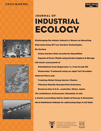
JOURNAL OF INDUSTRIAL ECOLOGY
Transforming Industrial Systems for a Greener TomorrowJOURNAL OF INDUSTRIAL ECOLOGY, published by Wiley, is a leading academic journal that focuses on the intersection of industrial practices and ecological sustainability. With an ISSN of 1088-1980 and an E-ISSN of 1530-9290, this journal has established itself as a premier outlet for research in economic, environmental, and social sciences, evidenced by its Q1 rankings in key categories such as Economics and Econometrics, Environmental Science, and General Social Sciences as of 2023. Spanning over two decades from 1997 to 2024, it offers invaluable insights into innovative approaches for designing sustainable industrial systems, informing policy decisions, and advancing interdisciplinary collaborations. While the journal does not currently offer open access options, its high impact in the field—illustrated by its impressive Scopus rankings, where it ranks 5th among 275 in General Social Sciences and 23rd among 233 in General Environmental Science—reinforces its importance to researchers, professionals, and students dedicated to the principles of sustainable development and industrial ecology.

REUNIR-Revista de Administracao Contabilidade e Sustentabilidade
Connecting scholars and practitioners for impactful sustainability insights.REUNIR-Revista de Administração Contabilidade e Sustentabilidade is a prominent academic journal published by the Universidade Federal de Campina Grande, under the auspices of the Centro Ciências Jurídicas e Sociais. With a dedicated focus on the intersection of administration, accounting, and sustainability, this journal serves as a vital platform for researchers, professionals, and students seeking to explore innovative practices and theories within these fields. Although currently not classified as Open Access, it maintains a commitment to disseminating high-quality research, thereby fostering scholarly dialogue and practical application. The journal adheres to rigorous academic standards and aims to contribute significantly to understanding sustainable management practices in various organizational contexts. As it evolves, REUNIR promises to be an essential resource for those dedicated to advancing knowledge and implementing effective solutions in administration and sustainability.
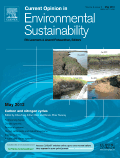
Current Opinion in Environmental Sustainability
Championing Collaboration in Sustainability ScienceCurrent Opinion in Environmental Sustainability, published by Elsevier Science Ltd, is a leading academic journal that specializes in exploring innovative strategies and emerging trends in environmental sustainability. With an impressive impact factor that reflects its esteemed position within the field, this journal is classified as Q1 in both the Environmental Science and Social Sciences categories for 2023, indicating its high-quality and influential contributions. The journal has been at the forefront of sustainability discussions since its inception in 2009 and continues to provide a platform for multidisciplinary research and critical analysis. As a key resource for researchers, professionals, and students alike, Current Opinion in Environmental Sustainability ensures open access to valuable insights while fostering collaboration and knowledge sharing across various domains. This journal not only serves to inform and inspire but also aims to address the pressing challenges of sustainability in our evolving world, making it an essential read for anyone engaged in environmental studies.
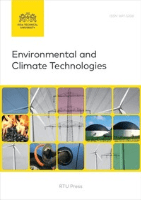
Environmental and Climate Technologies
Uniting Ideas to Combat Climate Challenges.Environmental and Climate Technologies is a premier open-access journal dedicated to advancing knowledge in the fields of environmental science and renewable energy. Published by SCIENDO since 2009, this journal plays a crucial role in disseminating innovative research and interdisciplinary studies that address the pressing challenges posed by climate change and sustainable development. With its current positioning in the Q2 quartile for Environmental Science (miscellaneous) and Q3 for Renewable Energy, Sustainability and the Environment, it is recognized for its significant contributions to the academic community, ranking #107 out of 233 in General Environmental Science and #161 out of 270 in Renewable Energy. Hailing from Germany and operating under an open-access policy, Environmental and Climate Technologies ensures that research remains accessible to a global audience, fostering collaboration and discussion among researchers, professionals, and students alike. The journal invites rigorous scientific inquiries and practical solutions that can mitigate the impact of climate-related issues, making it a vital resource for those committed to environmental stewardship and sustainability.
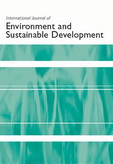
International Journal of Environment and Sustainable Development
Connecting disciplines for environmental progress.The International Journal of Environment and Sustainable Development, published by INDERSCIENCE ENTERPRISES LTD, serves as a vital platform for researchers, practitioners, and policymakers engaged in the multidisciplinary fields of geography, renewable energy, and environmental sustainability. With an ISSN of 1474-6778 and an E-ISSN of 1478-7466, this journal has been disseminating critical research since its inception in 2002 and continues to expand its scope through 2024. Recognized within the Q3 quartile in Geography, Planning and Development and Q4 in both Management, Monitoring, Policy and Law and Renewable Energy, Sustainability and the Environment, it provides valuable insights into contemporary issues affecting our planet. While access options are limited to non-open access formats, the journal remains essential for those seeking to enhance their understanding of sustainable development practices and policies in a global context. The International Journal of Environment and Sustainable Development is not only an academic repository but also a catalyst for dialogue and innovation within the environmental sciences.
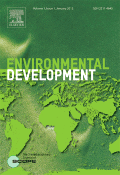
Environmental Development
Innovating interdisciplinary approaches to environmental challenges.Environmental Development is a premier academic journal published by Elsevier, dedicated to advancing the field of environmental science through interdisciplinary research and innovative practices. With a focus on geography, planning, and development, as well as management, monitoring, policy, and law, this journal provides a rigorous platform for scholars and practitioners to share insights that shape sustainable environmental policy and practice. Holding a prestigious Q1 ranking in both relevant categories and boasting impressive Scopus rankings - 62 out of 821 in Geography and 60 out of 399 in Environmental Science - Environmental Development stands out as a critical resource for those invested in the future of our planet. The journal emphasizes impactful research that addresses contemporary challenges, fostering dialogue across disciplines and geographical boundaries. With a commitment to high-quality research, it offers an important outlet for those aiming to influence environmental policy and developmental strategies globally. Join the growing community of researchers, professionals, and students engaged in promoting sustainable environmental practices through the knowledge shared in this esteemed publication.
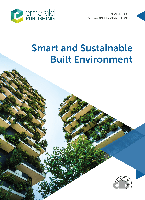
Smart and Sustainable Built Environment
Elevating urban studies with impactful sustainability insights.Smart and Sustainable Built Environment, published by Emerald Group Publishing Ltd, is a prestigious journal dedicated to advancing the knowledge and practice of sustainable development within the landscape of modern architecture, building, and civil engineering. With an impact factor that reflects its strong influence and standing—illustrated by its consistent categorization in the Q1 tier across several relevant fields including Architecture, Building and Construction, and Urban Studies—this journal has become an essential resource for researchers, practitioners, and policymakers alike. Operating in the vibrant academic backdrop of the United Kingdom, it aims to publish cutting-edge research that addresses critical issues at the intersection of sustainability and built environments. The journal is also indexed in Scopus with impressive rankings, ensuring visibility and credibility. The scope of the journal encompasses a broad array of topics, encouraging contributions that discuss innovative practices, policies, and technologies to foster smart and sustainable development. With its dedication to publishing high-quality research from 2012 to 2024, Smart and Sustainable Built Environment is at the forefront of fostering dialogue and collaboration in the pursuit of sustainable solutions for our built environment.